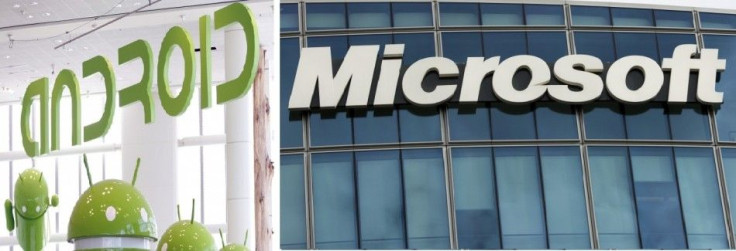Google vs. Microsoft: When Patents Become Personal

There's nothing like a good old fashioned flame war between two of the biggest tech giants in the world.
That's exactly what we've got as Microsoft and Google have taken to various communicative mediums to fight over an issue regarding patents. The whole ordeal started a few days ago when Google posted a blog from chief legal officer David Drummond about how Microsoft and Apple teamed together with a few other tech firms to halt Android's success.
They did this, he said, by acquiring patents from Nortel and Novell. The goal, he says, is to hike up the price that it costs manufacturers to license Android phones. He said the $4.5 billion the consortium of Apple, Microsoft and the others paid for the patents had an estimated worth of $1 billion.
According to Drummond, the growing popularity of Android has led to two distinct things. It's led to new devices for the consumer and jealousy from Google's competitors.
"Android's success has yielded something else: a hostile, organized campaign against Android by Microsoft, Oracle, Apple and other companies, waged through bogus patents," Drummond said.
Microsoft wasn't willing to take those insults lying down. The company's Vice President of Corporate Communications for Microsoft Frank Shaw swiftly responded via Twitter. He tweeted a picture of an email from Google's Kent Walker to Microsoft's Brad Smith which indicated Microsoft offered Google a chance to bid with the group and Google didn't want to.
In the alleged email, Walker wrote to Smith:
"After talking with people here, it sounds as though for various reasons a joint bid wouldn't be advisable for us on this one. But I appreciate your flagging it, and we're open to discussing other similar opportunities in the future."
Smith confirmed this via his twitter saying, "Google says we bought Novell patents to keep them from Google. Really? We asked them to bid jointly with us. They said no."
Google then responded to this response. In an update to the blog, Drummond dismissed Microsoft's email as a "false gotcha." He said Microsoft didn't address the substance behind the email.
Here's Google's response:
"If you think about it, it's obvious why we turned down Microsoft's offer," Drummond said. "Microsoft's objective has been to keep from Google and Android device-makers any patents that might be used to defend against their attacks. A joint acquisition of the Novell patents that gave all parties a license would have eliminated any protection these patents could offer to Android against attacks from Microsoft and its bidding partners."
It didn't take long for Shaw to respond to this response. He once again went to Twitter to respond. He said Google is the one who wanted to use the patents against competitors.
"Hello again David Drummond. This is going to take a few tweets, so here we go. Let's look at what Google does not dispute in their reply. We offered Google the opportunity to bid with us to buy the Novell patents; they said no. Why? BECAUSE they wanted to buy something that they could use to assert against someone else. SO partnering with others & reducing patent liability across industry is not something they wanted to help do," Shaw said in a series of tweets.
Google is clearly read to fight this fight. The company recently hired a legal patent lawyer from the Federal Trade Commision, Suzanne Michel. It also recently scooped up 1,000 patents from IBM.
Still, not everyone is a fan of Google's moves. As some on Twitter have mentioned, Google has prepared some ridiculous patents in their own right.
Whose side are you in this war of the words: Google or Microsoft?
© Copyright IBTimes 2024. All rights reserved.











